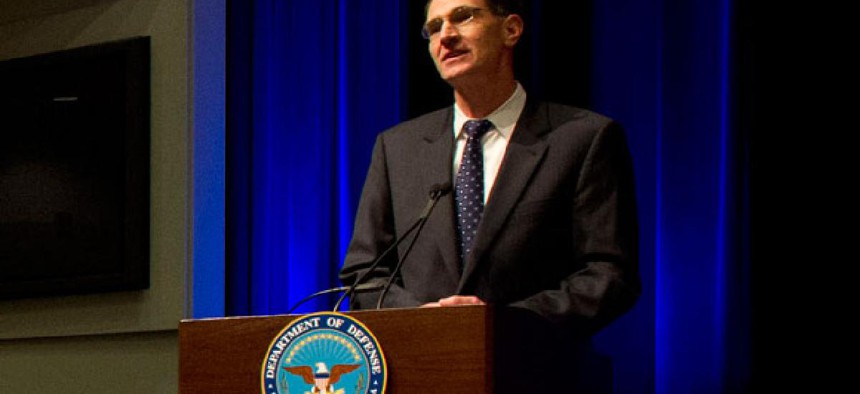
Defense Department file photo
Defense Policy Chief Outlines Furlough Preparation
Official tells staff to plan for personnel gaps to ensure work doesn’t fall through the cracks during sequester.
A senior Defense official is urging his team to review office responsibilities and assign backup personnel to projects to ensure work isn’t neglected if employees are furloughed.
James Miller, Defense undersecretary for policy, sent an email on Wednesday to the policy team outlining plans for adequate staff coverage if sequestration takes effect on March 1 and employees are furloughed. Affected Defense civilians could receive furlough notices in March, for furloughs that would begin as early as April 26, according to Miller’s email, obtained by Government Executive .
“Review office portfolios and backups to schedule best possible office coverage,” wrote Miller in the email sent Feb. 20, the same day the Pentagon officially notified Congress that it will have to furlough most of its 800,000 civilian workers under sequestration. In a memo to employees, outgoing Secretary Leon Panetta said affected workers would receive 30 days’ notice before any furloughs occur, and the department would do what it could to shield benefits.
Miller’s email indicates that agency officials are preparing for the possibility that furloughs could still be occurring in several months. “We understand there may be gaps in coverage if a furlough continues through the summer period when most personnel take vacations, but such gaps should be minimized. In addition, alternate work schedules should be reviewed and can be modified to help with coverage.”
Work should be saved on shared drives, Miller advised, so it can easily be accessed by appropriate personnel. Miller also said his team should assume that they will have flexibility to apportion 16 hours of furlough within each pay period -- not across pay periods. “Overtime and comp time should only be utilized in rare situations approved by COO [chief operating officer] and, therefore, should not be assumed when planning office coverage.”
All Defense civilian employees are subject to furlough except those deployed to a combat zone; those who protect life and property; employees paid with non-appropriated funds; political appointees and foreign nationals. Military personnel are exempt from furlough.
With the sequester deadline a week away and Congress still on recess, the automatic, governmentwide spending cuts at this point seem inevitable -- at least for a little while. Congress and the White House this week have amped up the blame game over who’s responsible for the latest budget impasse, which could result in serious economic consequences across the country if it’s not resolved. House Majority Leader Eric Cantor, R-Va., called on President Obama to cut government waste and reduce feds’ retirement benefits to save money instead of putting national security at risk through sequestration.
“Rather than degrade our military strength, the president should instead cut waste, like smoking machines and EPA grants to foreign countries,” Cantor said in a statement. “Rather than take border patrol agents off the job, the president should instead choose to reform the federal employee retirement system so it matches what people get in the private sector. Rather than let criminals run through the streets, the president should instead choose to eliminate slush funds and require people that get an overpayment from the government to return that money.”
On Wednesday top Defense officials outlined the department’s process for furloughs if sequestration happens; Comptroller Robert Hale called it “the most distasteful task” of his four-year tenure. Last week, Cabinet secretaries and the controller for the Office of Management and Budget testified before Congress on the impact sequestration will have on employees and various government services, including air traffic control, airport security, food inspection and other federal programs.
Miller’s email to the policy team reflected what many agency officials are saying about the impending spending cuts, if not publicly, then certainly privately. “This is a difficult email to write. First, because it is necessary due to a failure to date of leadership in Congress to meet their fundamental responsibility to reach agreement in order to avoid sequestration,” Miller said. “Second, and more acutely, because the effects of sequestration will be felt so directly and severely by our civilian staff in OSD [Office of the Secretary of Defense] Policy who contribute so much to the security of our great country -- and whose continued contributions are essential for our future security.”
Time Until Sequester:







